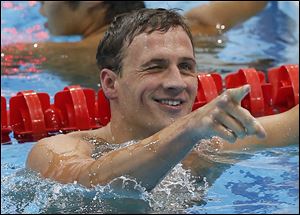
Ryan Lochte coasts to gold in 400 IM; Phelps finishes 4th
7/28/2012
Ryan Lochte reacts after winning the 400-meter individual medley on Saturday night in 2012 Summer Olympics in London. Teammate Michael Phelps finished fourth.
LONDON — You could see the cost of greatness Saturday night. Michael Phelps finished in fourth place, stared in disbelief at the scoreboard, tossed his swim cap to his left, pushed himself out of the cool water he's grown to despise, and walked out of the Aquatics Centre with a live TV camera moving in front of him the entire way.
OBJECTHis duel with rival Ryan Lochte never really materialized as Lochte met the high expectations he set for himself by winning a gold medal, and Phelps looked little like the biggest star from the 2008 Games.
Phelps twice stopped and politely answered a few questions from a large crowd of reporters -- many of whom, being honest, would not have been covering this 400-meter individual medley if not for Phelps.
How did this happen?
"Crappy race," Phelps said.
For the first time since the dawn of the new millennium, Phelps did not have it in an Olympic event. When he settled for fifth in the 200-meter butterfly at the 2000 Games, he was 15, the future of U.S. swimming.
The future is now, and, Phelps' rocky start to these 2012 Games notwithstanding, isn't it wonderful? Phelps has said his goal all along was to help turn the sport into a mainstream attraction. Sure enough, around 900 media members were present to witness Lochte's finest hour.
Lochte, a blue-eyed and curly-haired Floridian, swam away with the 400 IM with a time of 4:05.18. He is unlikely to be done winning gold medals any time soon, and he will be the first to tell you that.
"I've said this before, that this is my year," Lochte said. "I know, because I've put in hard work. I've trained my butt off for four years."
This event is the ultimate test of swimming versatility and endurance. Once Lochte got going in the third stanza, the breaststroke, Phelps' chance at a third gold medal in a row in this event evaporated into the London gray.
Phelps appeared to be in prime position to medal but lost his spot on the podium in the final 100 meters of the freestyle to Japan's Hagino Kosuke. Phelps' time of 4:09.28 was a major disappointment considering that he had the second-best qualifying time behind Lochte, a 4:07.89 at the U.S. Olympic trials in June.
Did Phelps get worse in the last month? Or was Saturday a poorly timed aberration?
A case could be made for the latter. Phelps was even worse in the preliminary heat Saturday morning, squeezing in the eighth and final spot with a 4:13.33.
"I was lucky to get in the final," Phelps said.
Still, this was Michael Phelps swimming in the Olympics. Saturday night, anything felt possible, even out of the dreaded Lane 8, where only three swimmers have won a gold medal in history. This was one of the hottest tickets of the Games, and those who paid handsomely to get in the door were hoping Phelps had just been going out of his way to build up the drama.
High up in the Aquatics Centre, San Diego natives Willy Ayyad and his 12-year-old son, Hunter, went all-in on Phelps over Lochte.
"We're big Michael Phelps fans," Willy said. "We bet my wife and daughter five bucks that Phelps is going to win over Lochte."
An air of invincibility is what Phelps put on the table up by deciding to return from a two-plus-year slumber and begin training hard to compete for London. After winning a record eight gold medals in Beijing, bumping his overall count to 14, he ignored the wishes of his coach, Bob Bowman, and did his own thing. It wasn't too long before Phelps was photographed at a college party with a bong, which led to a loss of his Kellogg's sponsorship and a public admonishment from USA Swimming.
While Phelps was off enjoying his newfound freedom, Lochte was getting his act together. Lochte won his first individual gold medal at Beijing in the 200-meter backstroke, but that was not against Phelps, whom Lochte was 0-3 against in their Olympic match-ups after Beijing. Lochte and Phelps are both 27, but Lochte is 11 months older, and in comparison to his American teammate, all he could hope for was to be a late bloomer.
Lochte had always been more of a free spirit, choosing to skateboard and surf in his spare time. But Beijing taught him something.
"I was young," Lochte said. "And I changed some things after Beijing in my diet, in my training, and I've just gotten a lot faster since then. If I had known that years ago, I think Beijing would have been a different scenario for me. But you live and learn."
Lochte and Phelps were heading in different directions. Lochte began routinely beating Phelps post-Beijing, which contributed to Phelps' desire to get back in the water.
Still, the fact remains: Phelps didn't have to do this to himself one more time. He had more Olympic gold on his mantle than most athletes could imagine.
After Saturday, Phelps still has 10 more gold medals than Lochte's four, and he's got six races to add to his collection -- the 200 IM, the 200, and 100 butterfly, and the three relays.
The Block News Alliance consists of The Blade and the Pittsburgh Post-Gazette. J. Brady McCollough is a reporter for the Post-Gazette.